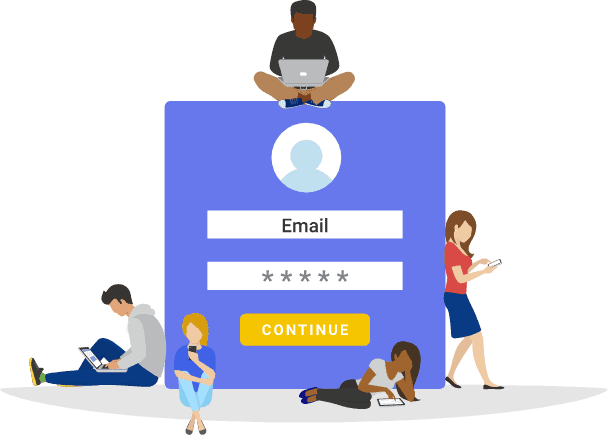How To Delete Personal Information from Google
You can delete your private details from Google by following a few steps or watching our short video.
Whether you want to avoid identity theft, hide a troubling social media presence, eliminate misinformation, or decrease the risk of being stalked, deleting your personal information from Google is an essential first step.
Fortunately, it’s not that hard to clean up what information Google has of you. Although you may not be able to wipe your online presence completely, taking these steps will help you claim a little bit more online privacy and anonymity.
Googling yourself may bring up some troubling results, but will Google let you delete that information? We’ll show you how to clean up your internet presence, particularly your personal information.
How To Remove Personal Information from Google
One of the easiest ways to take down a page that contains your personal information is to either contact the website administrator or Google itself. The former could result in your information getting taken off the site, while the latter simply removes the specific page from Google search. The right course of action, then, is to contact the site administrator first. If that doesn’t work, it’s time to contact Google.
Contact Site Owner
To contact the site owner, try these methods in order:
- Use the “Contact Us” page that is on most websites.
- If that doesn’t work, look up the site’s registrant email or administrative contact on WhoIs.
- Finally, if neither of the above options works, contact the site’s hosting company directly.
Once the site owner removes the web page, it will eventually be removed from Google search, as well. If the content is outdated, you can speed up the process by using Google’s Outdated Content Removal tool.
Contact Google
If you’ve failed to contact the site’s owners, or if they refuse to remove the content, then you can contact Google. However, note that they won’t remove all personal information, just personal information that creates “significant risks” of harm like financial fraud or identity theft. They’ll also remove content for legal reasons, like if it violates the Digital Millennium Copyright Act or if it’s child pornography, which is illegal. Again, while Google can remove sites from their search pages, the site will still be available on the web and through other search engines. Here are the common types of content that Google may remove:
- Non-consensual explicit, personal images: Google will remove images that show an individual nude, in a sexual act or intimate state, if the person didn’t consent to the imagery or act and it was made public without their consent. Essentially, Google can remove any sexual imagery that was intended to be private.
- Fake pornography: Google will also remove any fake imagery where an individual is identifiable and is depicted as either nude and/or in a sexually explicit situation. The image also needs to be distributed without the individual’s consent for Google to remove it.
- Content on sites with exploitative removal practices: Some websites post content and make users pay to remove it. If the individual is the subject of the content, the website is not a business review site, and it necessitates payments for removal, you can ask Google to remove it for you, for free.
- Financial, medical, or national ID info: Google will also remove any national identification numbers like Social Security numbers, bank account and credit card numbers, images of signatures, and personal medical records.
- Doxxing content: Doxxing is when people expose an individual’s contact information with the intent to cause harm, calling for people to harass them. To qualify, the content must include both contact information and explicit or implicit threats or calls to action to harm or harass the individual. Doxxing does not apply to everyday instances of contact information such as online directories, government documents, or business and real estate records. It also does not apply to content determined to be “of public interest” such as government records, criminal conduct records, or professional contact information that’s shared in professional wrongdoing allegations like fraud or scams. This public interest information also applies to any information pertaining to public officials or active civic participation, according to Google.
Outdated content: Google will also remove outdated content in a few instances:
- Pages or images no longer exist
- Page no longer has critical, important, or sensitive content
- The individual doesn’t own a search results page
- Content has been removed but is still showing up in Google searches; in this case, the information may still be showing up due to a snippet or cached copy, so you’ll have to request removal again.
More Ways To Maintain Your Privacy Online
If you’ve removed or requested to remove your personal information from Google, there are a few other steps you can take to stay as private as possible online.
- Google yourself: First and foremost, it’s always important to Google yourself periodically to see what comes up. You can even set up Google alerts in your name to ensure that nothing harmful about you is being posted online.
- Deactivate accounts: Rather than simply not using social media, it’s best to completely deactivate your accounts, and any other blogging accounts you may still have. This means that the companies will actually delete all of your information so it won’t show up anywhere online.
- Junk email: Many online checkouts ask for an email before you can place your order; we recommend making a fake email account up for these instances.
- VPNs: VPNs will hide your web activity and device IP addresses, meaning that you can browse privately online. Your Internet Service Provider (ISP) won’t have access to any of the websites you visit, nor will would-be hackers.
- Tor: Tor is another way to surf the web anonymously and without getting tracked by your ISP. Tor is an anonymity project that gives you access to a secure network (often called the deep web) where you can browse freely without revealing your real IP address and location.
- Check out as a guest: If it’s an option, always check out as a guest so you can avoid giving your personal information to websites.
- Don’t give out information: As a general rule, only provide your email address and phone number when absolutely necessary.
Delete your information from collection websites: Finally, get large data collection companies to delete your data and stop selling it to other companies for targeted advertising. You can go about this two ways: one, by using an automated service like DeleteMe, Metal Rabbit, or Reputation Defender, or by doing so manually. Here are the largest data collection websites and how to get your information deleted manually.
| Name of Data Collection Website | URL | Phone Number | Mailing Address | |
|---|---|---|---|---|
| Acxiom LLC | Acxiom LLC | 1-877-774-2094 | consumeradvo@acxiom.com | Consumer Advocate
Acxiom P.O. Box 2000 Conway, Arkansas 72033 |
| CoreLogic | n/a | 866-873-3651 | privacy@corelogic.com | Mark Wynn
Sr Ldr, Compliance Officer 40 Pacificia Suite 900 Irvine, California 92618 |
| Epsilon Data Management, LLC | Epsilon Data Management, LLC | n/a | n/a | n/a |
| Equifax Information Services LLC | Equifax Information Services LLC | 866-295-6801* must be 18 or older to call | n/a | n/a |
| Exactis | n/a | 386-283-5060 | success@exactis.com | 1 Florida Park Drive 2 Suite #308
Palm Coast, Florida 32137 |
| Experian LLC | Experian LLC | 888-397-3742 | dataselect@experian.com | Chief Privacy Officer, Compliance Department, Experian
475 Anton Blvd. Costa Mesa, California 92626 |
| Innovis | Innovis | 855-871-3076 | privacy@innovis.com | Attn: Privacy Officer
250 E. Broad Street Columbus, Ohio 43215 |
| Intelius | Intelius | 888-245-1655 | support@mailer.intelius.com | n/a |
| KBM | KBM | 866-275-4526 | donotmail@wundermanthompson.com | n/a |
| Oracle Data Cloud and Datalogix | Oracle Data Cloud and Datalogix | n/a | n/a | n/a |
| PeekYou | PeekYou | n/a | info@peekyou.com | PeekYou
P.O. Box 705 Ashburn, Virginia 20146 |
| PeopleFinders | PeopleFinders | 800-718-8997 | n/a | n/a |
| PeopleSmart | PeopleSmart | 1-866-885-6480 | support@peoplesmart.com | MSC- 149098
P.O. BOX 105168 Atlanta, Georgia 30348 |
| Quantcast | Quantcast | n/a | n/a | Quantcast
795 Folsom St. San Francisco, California 94107 |
| Recorded Future | n/a | 1-617-553-6400 | n/a | Recorded Future
363 Highland Avenue Somerville, Massachusetts 02144 |
| Spokeo | Spokeo | 888-558-9004 | privacy@spokeo.com | n/a |
| Tapad | Tapad | 646-561-6500 | privacy@tapad.com | Tapad
551 5th Avenue 9th Floor New York, NY 10176 |
| Tower Data | Tower Data | 646-742-1771 | privacy@towerdata.com | Tower Data
33 Irving Place, 3rd Floor, Suite 4030 New York, NY 10003 |
| TransUnion | TransUnion | 866-310-8783 | n/a | n/a |
| Verisk | n/a | n/a | privacy@verisk.com | Insurance Services Office, Inc. Attention: Chief Privacy Officer
545 Washington Boulevard Jersey City, New Jersey 07310 |
| White Pages | White Pages | n/a | support@whitepages.com | n/a |
| ZoomInfo | ZoomInfo | 833-901-0859 | remove@zoominfo.com or privacy@zoominfo.com | ZoomInfo Attention: Privacy
805 Broadway, Suite 900 Vancouver, Washington 98660 |
Did You Know: While these are some of the largest data brokers around, there are hundreds more located around the world. It’s why we recommend using a data removal service to scour the internet and remove your profile from these databases. Take a look at our review of DeleteMe and our Optery review and Kanary review to see which one is best for you.
Can You Remove Public Records?
Unfortunately, no one has complete control over what personal information shows up on Google or the internet in general. Public records, for example, can’t always be removed. In fact, California’s constitution, as well as its Public Records Act, states that the Secretary of State must provide public access to public records, So if you submit documents for filing with the Secretary of State in California, this information will be made publicly available. Similar legislation exists in other states, as well. Although California is one of the strongest states for data privacy, getting public records removed from government websites isn’t always legal or possible.
Why Do People Search for Others on Google?
There are a number of reasons why people would search for others on Google, but it typically has to do with social networking, dating, and employment.
Social Networking
Googling friends and acquaintances is a way of catching up with people with whom you may not be in regular contact. Dr. Yasmin Ibrahim, a professor of Digital Economy and Culture at the Queen Mary University of London, told Mashable that the digital economy “teases out…the inherent curiosity in the human condition,” rendering humans as “trackable entities who can be followed and in some ways surveilled through their virtual presence online”. In other words, rather than call a friend to catch up, people may simply Google them to get updates.
Dating
A study from JDP asked people if they researched their dates before meeting them.
Do you research people before going on dates?
| Always | Usually | Sometimes | Rarely | Never |
|---|---|---|---|---|
| 38% | 23% | 16% | 12% | 11% |
As you can see, the majority of people, 61 percent, always or usually research people before going out on dates, making the search results important for forming romantic relationships.
Employment
Similarly, over half of employers have found content on social media that caused them not to hire a candidate. Moreover, 70 percent of employers use social networking sites to research job candidates, and an additional 48 percent use social media to check up with current employees. Subsequently, 34 percent of employers have reprimanded or fired employees based on the online content they found, so making sure that your Google search results are clean is also essential for your professional life.
What Does My Google Search Say About Me?

Laws Surrounding Data Removal Requests
Laws regarding data removal requests differ from state to state, and there’s no federal right to opt-out of data collection or right of deletion. The right of deletion means that the user can request that businesses delete personal information about them posted online in certain conditions. Lawyer and Security.org Chief Editor, Gabe Turner, explains, “The United States…has failed to create a true individual right to privacy. Legally, there is no federal right to erasure as established by the GDPR…[instead], each state must legislate its own laws protecting the privacy of its citizens” He continues, “Interestingly, the protections extended through the Fourth Amendment regarding electronic tracking and privacy have yet to be stretched to include corporate aggregator overreach, consequently, while there are laws in some states establishing the right to protect some personal data, there is no absolute right to erasure under any federal or state law.” Currently, the following 13 states offer their residents the right of deletion:
- Arizona
- Illinois
- Maryland
- Minnesota
- Nebraska
- New Hampshire
- New York
- Pennsylvania
- Rhode Island
- South Carolina
- Virginia
- Wisconsin
- California
As we mentioned earlier, California has the strongest data privacy laws. The California Consumer Privacy Act of 2018, for example, gives California residents the right to delete personal information, with some exceptions, as well as the right to opt out of the sale of their data. However, this act does not apply to publicly available information from federal, state, or local government records such as property records and professional licenses. Again, you may not be able to get public records deleted.
FYI: One of the newer data removal services to hit the market is Incogni. It was created by one of our favorite VPN providers, Surfshark, and has been offered to Nord clients as well. Take a look at our Incogni review to learn more.
Final Thoughts
It can be a great idea to delete your personal information from Google. Perhaps you want to protect your privacy or mitigate risks like stalking, spam, identity theft, or online exposure. While you can’t really erase everything online, you can take steps to minimize how often your details show up online.
You can get started by contacting website admins to request your data be removed. If that doesn’t work, you can send that request to Google to remove it from their SERPs (search engine results page).
>> Next Steps: Our Favorite Data Removal Services
Beyond manually requesting your data get removed from Google, you can use data removal services to do this across hundreds of sites. Not only will they cover Google removals for you but it’s all done automatically – depending on the service you choose. Services like DeleteMe are affordable and comprehensive.
Additionally, you might want to consider practicing good digital hygiene. To further protect yourself, take measures like using VPNs to encrypt your internet activity, create separate junk email accounts, read up on privacy laws, and stay vigilant. If you want to learn more about digital security in general, read about the most common type of fraud by state, the data tech companies have on you, or safety while dating.
FAQs
-
How do I remove information from Google Search?
First, contact the website administrator to remove your personal data. If that doesn’t work, you can contact Google and use its removal tools to request the deletion of certain web pages from its search engine results.
-
How do I remove my personal information from the internet for free?
To remove your personal information from the internet for free you can request data removals manually from each site you no longer want to appear on. You can also use a data removal service. However, those typically require a paid subscription – some do offer free trials.
-
Why is my personal information on Google?
Your information is on Google because it’s indexed by websites that collect your data from public records, social media, and other forms where you may have shared information willingly.
-
Can Google delete my personal information from the internet?
Google does not have the power to delete your personal information from the internet. They cannot force a website to remove your personal information. But, they can prevent that website from showing up in its search results.
-
How can I check if my personal information is on Google?
You can Google your name to easily check if your personal information is on Google. We recommend putting quotation marks around your name as this tells Google to only show exact results.



 Outdated content: Google will also remove outdated content in a few instances:
Outdated content: Google will also remove outdated content in a few instances:
 Delete your information from collection websites: Finally, get large data collection companies to delete your data and stop selling it to other companies for targeted advertising. You can go about this two ways: one, by using an automated service like DeleteMe, Metal Rabbit, or Reputation Defender, or by doing so manually. Here are the largest data collection websites and how to get your information deleted manually.
Delete your information from collection websites: Finally, get large data collection companies to delete your data and stop selling it to other companies for targeted advertising. You can go about this two ways: one, by using an automated service like DeleteMe, Metal Rabbit, or Reputation Defender, or by doing so manually. Here are the largest data collection websites and how to get your information deleted manually.